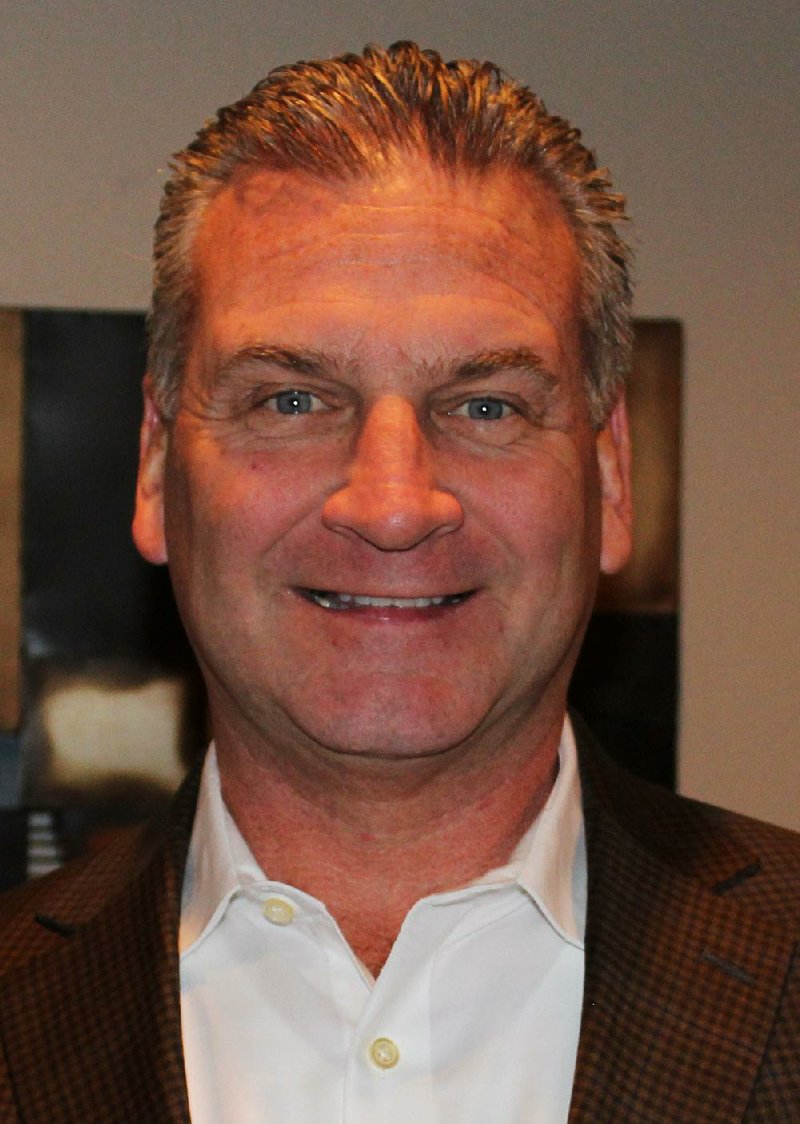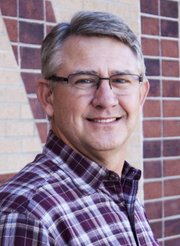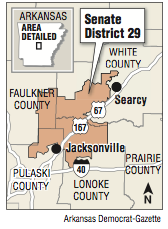CABOT -- Cabot Republicans Jim Coy and Ricky Hill are contrasting their business experiences in their bids for the Republican nomination in state Senate District 29.
Early voting in the Feb. 13 special primary election to fill a vacated seat starts Feb. 6, said Chris Powell, a spokesman for the secretary of state's office.
The winner of the special primary election will face Jacksonville Democrat Steven McNeely, an attorney, in the May 22 special election -- the same day as the regular primary election. Senate District 29 includes parts of Faulkner, Lonoke, Pulaski and White counties.
The victor in the special election will serve out the rest of the four-year term of Eddie Joe Williams, R-Cabot. Williams was elected in 2016 to a term that expires in January 2021. In November, Williams resigned from the state Senate to accept an appointment as President Donald Trump's representative to the Southern States Energy Board.
Two other special primary and special elections are being held in Arkansas on the same days as those above. One is for Senate District 16, to fill out the term of the late Greg Standridge, R-Russellville, and the other is for House District 83, to fill the vacancy created by the resignation of David Branscum, R-Marshall. Branscum resigned to become the U.S. Department of Agriculture's rural development director in the state.
In his pitch for District 29, Coy cited his business background working for Fortune 500 companies, such as Acxiom for 18 years starting in 1994, and for startup companies, such as the LWSI software company in Little Rock, where he worked from about 2014-16.
"I think my business acumen lends itself to be a strong partner to bring efficiencies into state government," Coy said in an interview at a Cabot coffee shop last week. He has been vice president of sales for Infutor Data Solutions based in Oakbrook, Ill., for the past year and served on the Cabot School Board from 2002-09.
Coy, 56, was born in Des Moines, Iowa, where he graduated from high school and received an associate degree in business administration from Des Moines Area Community College. He said he came to Arkansas in about 1987 as vice president of sales for the stock insurance company United Arkansas Co. He and his wife, Toni, have three children.
Hill pointed to his years of service in the community, and said his experience in agriculture and finance would be "a big plus" in serving in the Legislature.
He is executive vice president of Bank of the Ozarks, where he has worked since 2011, and served on the Cabot School Board from 2012-17. Hill previously was a vice president for First Security Bank and general manager for a farm supply company, both for 10 years.
"I understand my community, what the community needs are, and I listen to the people and try to do things that they would like to see done," he said in an interview at a Cabot fast-food restaurant last week. "I am a conservative."
Hill, 50, was born in Little Rock and graduated from Cabot High School. He received his bachelor's and master's degrees in agricultural business and economics from Arkansas State University. He and his wife, Cynthia, have two children.
Arkansas' version of Medicaid expansion has deeply divided Republicans ever since the Republican-controlled state Legislature and then-Gov. Mike Beebe, a Democrat, authorized the program in 2013. The program is now known as Arkansas Works under Republican Gov. Asa Hutchinson.
The program provides private health insurance to about 300,000 low-income Arkansans. The state's share of the cost of the program is projected to be $135 million in fiscal 2019, which starts July 1, while the federal government's share is projected to be $1.95 billion, according to the state Department of Human Services.
With Hutchinson's backing in 2016, Williams survived a primary election challenge from a critic of the Medicaid expansion, Cabot Republican R.D. Hopper.
But in the contest between Coy and Hill, "the governor is neutral and expects to stay out of the race," said Hutchinson chief political strategist Jon Gilmore.
Both Coy and Hill said they oppose the federal Patient Protection and Affordable Care Act signed into law by President Barack Obama in 2010. The state has operated the Medicaid expansion program under federal waivers granted under that law. The Affordable Care Act is often referred to as Obamacare.
Coy said, "I think Gov. Hutchinson has done an amazing job of taking a conservative approach to utilize the tools that he has to make our system work.
"I am supportive of his agenda regarding Arkansas Works," he said. "I think he has taken a good conservative approach in using a federal mandate with Obamacare that he was given, and applying the tools that he has."
Hill said, "I think the governor and the state Legislature took a bad deal and tried to make it better, but it's a mess and we still have to work with it and try to make it better.
"I support Arkansas Works based off what the Legislature has tried to do to make it better, to make Obamacare better. I still think there still is a lot of work that has to be done," he said. "I think we need to create more work requirements and make the ones that are receiving that [health insurance] pay something."
People with incomes above the poverty level are now charged $13 a month in premiums, and have small co-payments, such as $8 for a doctor's office visit, or $10 for a visit to a specialist.
Hutchinson awaits federal approval of changes to reduce the income eligibility for the program to 100 percent of the poverty level -- from the current 138 percent -- and impose work requirements for many of the people in the program. The state estimates that that would reduce the number of participants by about 60,000. Those whose incomes are between 100 percent and 138 percent of the poverty level would be eligible for federally subsidized coverage in non-Medicaid plans.
• While citing education as among his top priorities, Coy said, "I don't think at this point I would support vouchers" for the state to help pay for parents to send their children to private schools.
"I am pro public education. We started a charter school here in our district, and I am supportive of the alternative learning process in charter schools," he said.
Hill said he wants to learn more about any proposal for creating a voucher program before making up his mind about it. He said education would be a top priority for him, and he wants to place more emphasis on vocations such as welding and plumbing in the public schools.
• Both Coy and Hill said they want to improve highways and roads, and figure out how to raise more money for that.
"I would look at every viable option to fund the highways before having to review any tax increase. We should not have to increase taxes to pay for our roads," Coy said.
Hill said, "We have to either look at moving money around from other agencies or appropriate taxes from specific areas such as tires, oil and [other] auto-service areas." He said he would be open to considering a tax increase for highways "only if the people of Arkansas vote to do that."
• Hill said he plans on voting for a proposed constitutional amendment that would limit the award of certain damages in lawsuits as well as attorneys' contingency fees because it will be "an economic boon for us" by helping expand industry in the state and lowering health care costs.
Coy said he supports tort reform in general, and he wants to learn more about the proposed amendment before declaring his stance on it.
• Hill said he opposes abortion except for when the mother's life is at risk or in the cases of rape or incest. Coy said he also opposes abortion, and he wouldn't allow for abortion when the mother's life is at risk or in cases of rape or incest because "it's not the baby's fault. It's still a baby."
Hill said he would limit himself to serving a total of eight years in the state Senate, while Coy said he would consider whether to limit his service in the Senate after he serves two years. Amendment 94 to the Arkansas Constitution limits lawmakers to serving up to 16 years in the Senate or the House or in combined service in both chambers.
According to his campaign finance report, Hill reported lending his campaign $60,000, raising $16,125 in contributions and spending $26,499.67 through Dec. 31, leaving $49,625.33 in his campaign account.
In contrast, Coy reported lending his campaign $10,000, raising $16,300 in contributions and spending $9,935.64 through Dec. 31, leaving $16,364.36 in his campaign account.
State senators and representatives are each paid a salary of $40,188 a year, while the House speaker and Senate pro tempore get $45,900 a year. Lawmakers also receive per diem and mileage money for attending legislative meetings.
Metro on 01/28/2018



